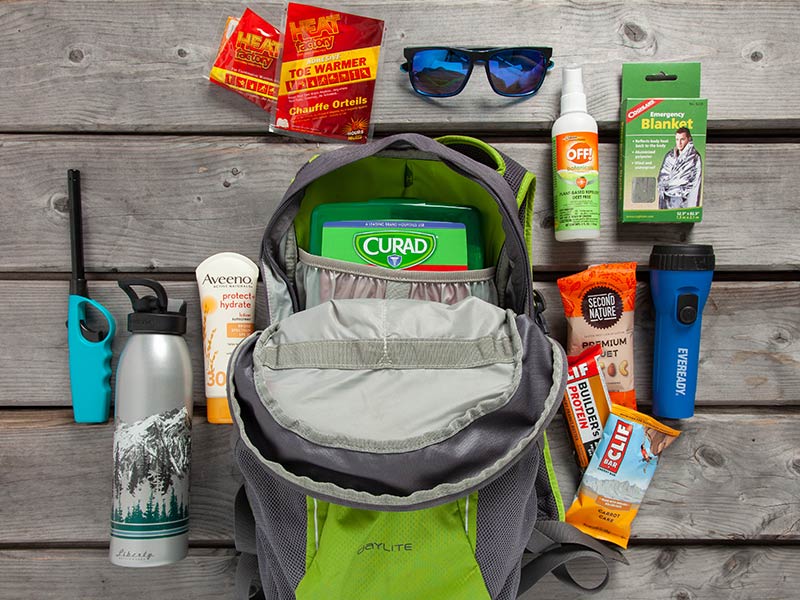

We’re in the height of hiking season here in WA state! The snow has given way to groves of wildflowers, and the mountains jagged peaks are beckoning us to come and explore. Before hitting the trail, it’s important to make sure you’ve packed the right things to ensure a safe and fun adventure in the mountains. Here’s our list of ten essential items to take with you on your next outdoor adventure:
- 💧Water: Plain and simple, you won’t be a happy camper if you forget your water at home. We recommend packing one large water bottle and keeping an extra water resevoir, bottle or portable water filter in your car. Also, bring more water than you think you’ll need just in case your hike takes longer than you expected. For an additional benefit, consider bringing nuun tablets or water with added electrolytes to replenish your body after this good workout.
- 🥜 Food Yes, this is an obvious one, but not all food for hiking is created equal. Consider carrying foods in your day hiking pack with a high protein like protein bars, jerky, and mixed nuts. And carry a small trash bag or Ziploc bag to pack your scraps and trash. This ensures you comply with Leave No Trace hiking etiquette and the trails are kept clean.
- ☀️ Sun Protection: Sun exposure on the trail can lead to painful sunburn and dehydration, and increase your risk of sustaining a heat-related illness. Before hitting the trail, wear sunscreen (SPF 30+), chapstick, sunglasses, and a hat. You should also pack additional sunscreen and chapstick for reapplication at least every two hours. We have a fantastic assortment of sunscreens for your people of all ages and skin types, so you'll find the sunscreen that works best for you. Some options include: sweat-resistant sunscreen, sensitive skin sunscreen and children's and/or baby sunscreen.
- ⚕️ First Aid Kit: Injuries happen on the trail, whether it’s someone in your party, or perhaps someone you come across while making your climb to the top. Take a look at your first aid kit and make sure it’s fully stocked with bandaids, gauze (in a variety of sizes), sterile wipes for cleaning wounds, scissors, hydrocortisone cream, ibuprofen, benadryl and wound tape.
- 🦗 Bug Spray: Unfortunately, it’s common to have to contend with pesky mosquitoes and biting flies in the North Cascades and Olympics. Never fear, bug spray will help you fend them off. The CDC recommends choosing bug sprays that contain ingredients such as DEET, picaridin, or plant-based chemicals, such as lemon eucalyptus oil. This provides optimal long-lasting protection against bug bites and stings. If you’re not a fan of bug spray, consider lavender essential oil instead! Lavender is nature’s mosquito repellent, however, be mindful that bees are attracted to it. Other bugs you might encounter on the trail include ticks and leeches. Ticks can carry Lyme disease, and Rocky Mountain spotted fever (although rare), while leeches are often infected with harmful bacteria. Always pack a pair of tweezers to remove ticks and use a rigid, flat object like a credit card to detach a leech (don’t use salt or lemon as this can stress the leech, causing it to regurgitate infected blood into your wound).
- 🔦 Flashlight & Batteries: It’s easy to underestimate the amount of time a hike can take. Perhaps there are obstructions on the trail, it’s a steeper climb than you anticipated, or maybe you even took a wrong turn and ended up on a different trail than you had planned. Whatever the reason, it is common for hikers to find themselves still hiking when dusk falls. A flashlight will help ensure a safe and less anxious trip down the mountain.
- 🛏️ Emergency Blanket: We hope you never have to use this one, but in the event you find yourself still on the mountain at dark or during a storm, you’ll find the temperature can drop pretty drastically, even in the summer months. An emergency blanket is a very light weight and very effective tool keep you warm and prevent hypothermia if needed. You can also use the reflective surface of an emergency blanket to signal search parties or place it over a makeshift shelter for an added weather-proofing layer.
- 🖐️ Toe/Hand Warmers: Keeping your extremities cozy is critical when hiking. So, in addition to wearing or carrying extra layers of clothing, you should always pack toe and hand warmers. These items are beneficial even in the summer when you’re backpacking, camping, or find yourself caught in a storm. We also recommend packing an extra pair of socks to ensure you keep your feet dry. Whether your feet get wet from rain or trekking through streams and puddles, damp feet can blister easily and are at a higher risk of developing Aathlete’s foot. At Bartell’s, we carry high-quality socks to add to your pack, including breathable, moisture-wicking socks to keep your feet warm and dry on the trail.
- 🔥 Fire Starter/Lighter: Fire is another important element when you’re out in nature. Fire can be used to boil water for drinking (if you can’t find potable water) or cooking, to keep you warm, and to heat up a tasty meal. Be mindful and careful of fire warnings and whether you’re allowed to light fires in your hiking/backpacking area given the dryness of the soil and time of year. Fires can easily spread and become out of control quickly.
- 🗺️ Other Items: You’ll also want to consider items such as a topographic map of your hiking area, a compass or GPS device, a swiss army knife/multi-tool/pocket knife and trekking poles for scaling steep inclines. We don’t currently carry these items at our Bartell stores. One item we currently stock is duct tape, which can be vital in the wilderness. Duct tape is durable and waterproof so you can use it to fix backpacks, tents, and clothing; build a shelter or emergency tool; or cover blisters or cuts. Pack duct tape as part of an emergency repair kit along with paracord, zip ties, safety pins, and a sewing kit.
It is also a good idea to carry a roll of toilet paper; you never know when nature will call on the trail and you may not have access to public amenities (especially if you are exploring the backcountry). Make sure you also carry a lightweight camping shovel to dig a cathole and pack out used toilet paper in a Ziploc bag.
Are there any other items that you consider essential for hiking? Tell us in the comments!
Happy Hiking.



